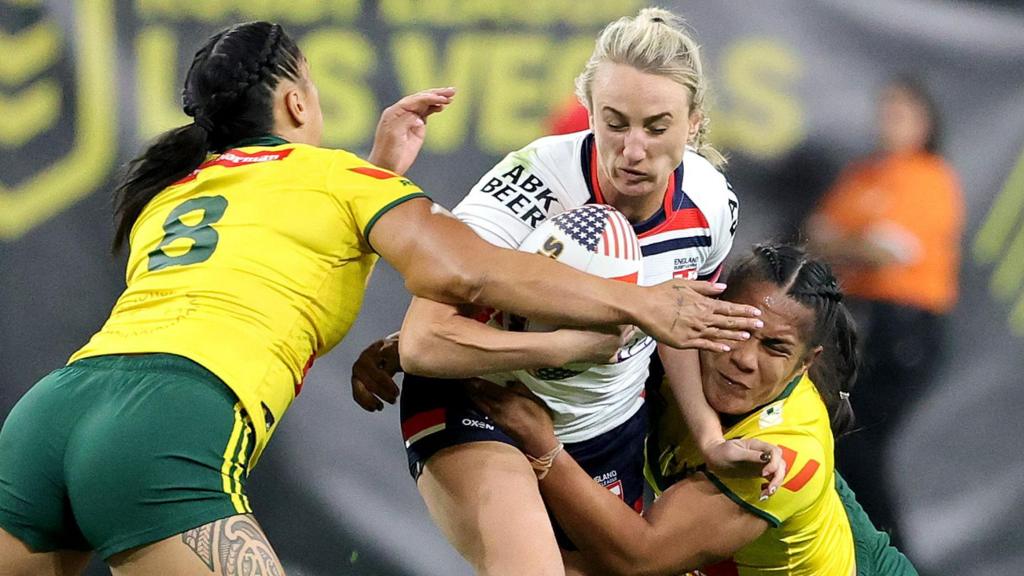Jodie Cunningham, a fixture of England’s international rugby league side, brought valuable experience into their clash with Australia, yet even her influence could not ignite the team.
‘What happens in Las Vegas, stays in Las Vegas’ is a phrase familiar to countless tourists who visit the city every year.
For the England women’s rugby league squad, however, that anonymity did not apply.
Their trip to Las Vegas — a humbling 90-4 defeat to world champions Australia — played out before a global audience in March.
Now, questions linger regarding the team’s future — including whether the previously planned Jillaroos tour will go ahead alongside the men, and how England can close the on-field gap with their Antipodean rivals.
While England’s men look ahead to a home series against Australia this autumn, no fixtures have been announced for the women.
Compounding the need for progress is the fast-approaching 2026 World Cup, set for the southern hemisphere.
The faces of Liv Wood and Paige Travis vividly reflected the reality of England’s Vegas experience.
When it comes to preparing for World Cups and major internationals, England face the persistent challenge of a lack of suitably matched northern hemisphere opposition.
Inviting teams like Tonga or Papua New Guinea is financially daunting, as is traveling for matches in the southern hemisphere.
Convincing wins over Wales and France perhaps lulled expectations — making the scale of defeat in Vegas all the more stark.
St Helens coach Dec Hardman, who has guided players such as Vicky Whitfield and Jodie Cunningham, was part of England’s staff in the United States.
He maintains facing Australia was the right call.
“The only way to measure where we’re at was to play them,” Hardman told BBC Sport. “Whether it was the ideal time of year is debatable, but is there ever a right time?
“Games like that give you a reality check — but they can fuel your motivation for what lies ahead in the next 18 months.
“In the future, these players could face Australia on Sunday, then New Zealand midweek, and Tonga, Samoa, or the Cook Islands the following weekend. The question is: how do we close that competitive gap?”
While Hardman does not claim to have all the answers, he believes listening to the players is crucial.
“What matters is that the players have their say,” he added.
“They’re living it, so their feedback is vital — especially regarding future expectations. Whether the Rugby Football League can meet those remains to be seen, but their voices must be heard.”
Women’s rugby league in England has come a long way, moving from muddy parks to Super League venues and, in the Challenge Cup, to Wembley.
Youth development is being fuelled by grassroots interest, clubs benefit from enhanced facilities, and athletes are better supported than in the past.
However, professionalism — with all players making a living from the sport — remains out of reach for much of the competition.
Many players balance jobs with rugby training. While top clubs can offer some payments or contracts, this is far from universal in the Women’s Super League.
In contrast, Australia’s NRLW operates as a fully professional, albeit compact, league. Players from New South Wales and Queensland contest profitable State of Origin matches and earn salaries.
Some English talents — such as Hollie-Mae Dodd, Georgia Roche, and Paige Travis — have taken up opportunities to join NRLW clubs in Australia.
Rugby league’s prominence in New South Wales and Queensland has generated significant commercial prospects for Jillaroos stars, who are as likely as athletes from football or cricket to appear in advertising campaigns.
Players including Leah Burke, Emily Rudge, and Jodie Cunningham can now aspire to Challenge Cup final appearances at Wembley.
Emily Rudge, a seasoned St Helens back-rower who did not feature in Las Vegas, has represented England since 16 and recognises the disparities with Australia first-hand.
“Even between NRLW and the Women’s Super League, there’s a considerable difference,” Rudge told BBC Sport. “We might appear professional — we’re linked to Super League clubs — but in reality, we work full-time and train twice a week in the evenings.
“It’s nowhere near Australia’s setup. It’s akin to Saints’ men playing Thatto Heath — a team of working players training a couple of evenings a week. The results are predictable.
“We’re competing against full-time professionals, while our own athletes give their best but lack comparable resources. It inevitably results in a mismatch.
“To outsiders, a 90-4 defeat looks huge. We’re progressing year on year — but so are Australia.”
Like Hardman, Rudge believes continued involvement from the sport’s authorities is essential for advancement.
Bella Sykes (centre) found value in the Las Vegas trip, though reactions among her teammates varied.
With players of diverse experience and temperament, differing responses to the Vegas defeat were inevitable.
Leeds Rhinos hooker Bella Sykes “loved” the chance to join the team in Las Vegas, embracing the atmosphere and the occasion.
While the match itself served as a stern test, it proved to be a valuable learning experience.
“It’s crucial that both staff and players assess what led to the outcome,” said Sykes. “The RFL is currently reviewing the league and the international calendar. As long as progress is made, players have no major complaints.
“When we spoke at camp, it was clear the experience affected everyone differently, influenced by their individual backgrounds and experience.
“Some players saw it very differently to me, and I understand why; but I remain positive about what we gained.
“Seeing teammates share their views on what needs to change was inspiring for me as a young player — it highlighted the areas where our game must develop.”
At just 20, Sykes represents the next generation striving to elevate England’s competitiveness with Australia and their southern hemisphere counterparts.

